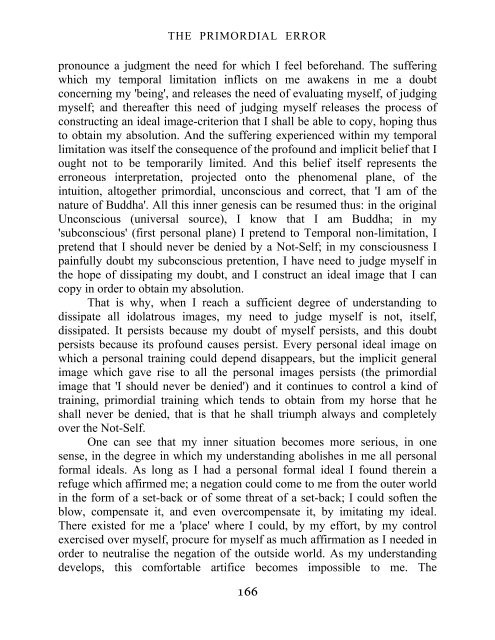The Supreme Doctrine - neo-alchemist
The Supreme Doctrine - neo-alchemist
The Supreme Doctrine - neo-alchemist
Create successful ePaper yourself
Turn your PDF publications into a flip-book with our unique Google optimized e-Paper software.
THE PRIMORDIAL ERROR<br />
pronounce a judgment the need for which I feel beforehand. <strong>The</strong> suffering<br />
which my temporal limitation inflicts on me awakens in me a doubt<br />
concerning my 'being', and releases the need of evaluating myself, of judging<br />
myself; and thereafter this need of judging myself releases the process of<br />
constructing an ideal image-criterion that I shall be able to copy, hoping thus<br />
to obtain my absolution. And the suffering experienced within my temporal<br />
limitation was itself the consequence of the profound and implicit belief that I<br />
ought not to be temporarily limited. And this belief itself represents the<br />
erro<strong>neo</strong>us interpretation, projected onto the phenomenal plane, of the<br />
intuition, altogether primordial, unconscious and correct, that 'I am of the<br />
nature of Buddha'. All this inner genesis can be resumed thus: in the original<br />
Unconscious (universal source), I know that I am Buddha; in my<br />
'subconscious' (first personal plane) I pretend to Temporal non-limitation, I<br />
pretend that I should never be denied by a Not-Self; in my consciousness I<br />
painfully doubt my subconscious pretention, I have need to judge myself in<br />
the hope of dissipating my doubt, and I construct an ideal image that I can<br />
copy in order to obtain my absolution.<br />
That is why, when I reach a sufficient degree of understanding to<br />
dissipate all idolatrous images, my need to judge myself is not, itself,<br />
dissipated. It persists because my doubt of myself persists, and this doubt<br />
persists because its profound causes persist. Every personal ideal image on<br />
which a personal training could depend disappears, but the implicit general<br />
image which gave rise to all the personal images persists (the primordial<br />
image that 'I should never be denied') and it continues to control a kind of<br />
training, primordial training which tends to obtain from my horse that he<br />
shall never be denied, that is that he shall triumph always and completely<br />
over the Not-Self.<br />
One can see that my inner situation becomes more serious, in one<br />
sense, in the degree in which my understanding abolishes in me all personal<br />
formal ideals. As long as I had a personal formal ideal I found therein a<br />
refuge which affirmed me; a negation could come to me from the outer world<br />
in the form of a set-back or of some threat of a set-back; I could soften the<br />
blow, compensate it, and even overcompensate it, by imitating my ideal.<br />
<strong>The</strong>re existed for me a 'place' where I could, by my effort, by my control<br />
exercised over myself, procure for myself as much affirmation as I needed in<br />
order to neutralise the negation of the outside world. As my understanding<br />
develops, this comfortable artifice becomes impossible to me. <strong>The</strong><br />
166




